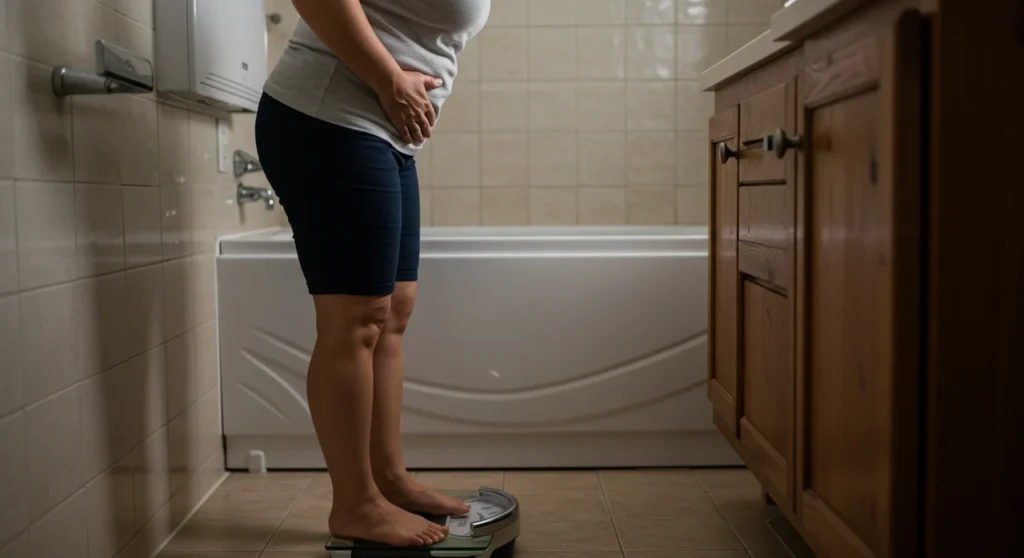Anúncio
You eat clean, exercise regularly, and even drink more water than your friends. Still, the scale stubbornly refuses to move. If that sounds familiar, you’re not alone—and you might not be imagining things. What if the extra weight isn’t fat at all? Shocking as it sounds, it could be due to something your doctor probably hasn’t mentioned: stuck poop weight gain.
Anúncio
Science shows that the average person harbors 5 to 20 pounds of fecal waste in the colon. That’s not just uncomfortable—it’s toxic. And this silent, often-overlooked burden could be stalling your metabolism, influencing your mood, and contributing to symptoms that seem completely unrelated. Let’s unpack what’s really happening inside your body—and more importantly, what you can do about it.

The Toxic Load That’s Weighing You Down
Let’s start with the numbers. The colon, which is part of your large intestine, can stretch up to five feet in length and has the potential to hold a significant amount of material. Research suggests that some individuals may be carrying 5 to 20 pounds of old fecal matter within their colon, depending on lifestyle, diet, and bowel habits. This isn’t just bulk; it’s metabolically active waste that can influence every major system in your body.
Anúncio
Why is this such a big deal? Because old stool becomes a breeding ground for harmful bacteria and yeast, disrupting the delicate microbiome in your gut. Over time, this imbalance can lead to conditions like candida overgrowth, leaky gut syndrome, and even nutrient malabsorption. You may eat well, but if your colon is congested, those nutrients might never make it into your bloodstream where they’re needed most.
This accumulated waste also physically expands your abdominal region, making clothes feel tighter and distorting your body image. People often mistake this for stubborn fat when, in fact, it may be a ballooning gut filled with decomposing material. Imagine the relief of letting that go—not just for your weight, but for your overall sense of vitality.
When Your Body Can’t Release, It Can’t Reset
Bowel regularity is more than a matter of comfort. It’s a biological imperative. When stool remains in the colon for too long, your body reabsorbs water—and along with it, potentially harmful substances like old hormones and metabolic waste.
This reabsorption can wreak havoc on your hormonal systems, particularly estrogen. Women with estrogen dominance often experience bloating, mood swings, and persistent weight gain—symptoms that can be exacerbated by constipation. Meanwhile, your adrenal glands, already dealing with daily stress, may begin to overproduce cortisol in response to the internal burden. That triggers fat storage, especially in the belly.
It becomes a vicious cycle: waste stays in, your system stays stuck. Your body’s ability to metabolize food, regulate hormones, and detoxify naturally is impaired. When the pipeline of elimination clogs up, everything downstream gets affected. And that makes true metabolic reset impossible—until you address the source.
The Gut-Brain Connection That Controls Your Appetite
Your gut is often called the “second brain” for good reason. It houses the enteric nervous system, a complex network of neurons embedded in the lining of your gastrointestinal tract. This system doesn’t just regulate digestion; it communicates constantly with your brain through pathways like the vagus nerve and the gut-brain axis.
When your colon is congested with waste, harmful bacteria can thrive and produce neuroactive compounds that interfere with normal brain function. These substances may disrupt serotonin production, a neurotransmitter responsible not just for mood, but also for satiety and cravings. When serotonin levels dip due to gut imbalance, you might find yourself constantly hungry, emotionally reactive, or reaching for comfort foods.
Moreover, inflammatory chemicals from your gut can cross into the bloodstream and impact areas of the brain associated with decision-making and impulse control. Suddenly, staying on track with a healthy diet feels like an uphill battle. It’s not lack of willpower—it’s biochemical sabotage from within.
Supporting gut health by clearing out stuck waste may help restore this delicate communication loop, allowing appetite cues to normalize and reducing emotional eating episodes.

Why Your Metabolism Hits the Brakes
Think of your metabolism as a multi-lane highway. When your colon is clear and your detox pathways are flowing, everything moves smoothly. But when waste piles up, the liver—your body’s central detox hub—gets overwhelmed, and traffic grinds to a halt.
Instead of prioritizing fat burning and energy production, your liver gets bogged down with neutralizing toxins from the gut. This diversion means fewer resources are available for metabolizing nutrients and hormones. The result? Slowed metabolism, weight retention, and chronic fatigue.
And it’s not just the liver. Your thyroid, which governs metabolic rate, is also affected by inflammation and toxin overload. Studies have linked gut dysbiosis and constipation with impaired thyroid function. Even mild hypothyroidism can lead to stubborn weight gain, low energy, and brain fog.
By clearing out your colon, you can reduce the liver’s workload, optimize thyroid function, and turn your metabolism back on—naturally and sustainably.
The Inflammation Cycle That Locks in Weight
The waste in your colon isn’t inert. It’s biologically active, often emitting inflammatory compounds like lipopolysaccharides (LPS) as it breaks down. These substances can seep through the gut lining—a condition known as intestinal permeability or “leaky gut”—and enter the bloodstream, triggering an immune response.
Inflammation from this toxic exposure doesn’t just cause discomfort. It alters insulin signaling, promotes fat storage, and increases water retention. Essentially, your body begins to treat this internal waste as a foreign invader—and in defense, holds onto extra fluids and fat to protect your organs.
This is especially common in individuals who experience swelling, puffiness, or unexplained weight fluctuations. You may not be gaining fat, but inflammation-driven edema makes it appear that way. Until the root cause—impacted waste and chronic gut irritation—is addressed, your body remains in a heightened state of alert.
Reducing gut inflammation by improving elimination not only supports better health overall but also helps restore the body’s natural fat-burning capabilities.
Simple Signs Your Body Is Crying for Help
You don’t need a colonoscopy to know something’s off. The body sends clear, often-overlooked signals when waste isn’t moving as it should. The trick is learning to recognize them before they escalate.
For example, bloating that intensifies after meals—even small ones—is a classic sign of trapped gas and delayed digestion. If you’re crashing in the afternoon despite getting enough sleep, it could be due to toxin-induced fatigue or poor nutrient absorption. And if your skin is breaking out, don’t just blame hormones; your gut may be trying to expel waste through the skin, another detox channel.
Other red flags include a sense of heaviness, mood swings, frequent cravings for sugar or carbs, and the telltale “food baby” look even on an empty stomach. These symptoms are your body’s way of saying, “I’m overloaded—please help.”
Listening to these cues and responding early can help prevent more serious imbalances down the line. Better still, addressing these issues can lead to a remarkable transformation in how you look, feel, and function daily.

The 3-Step Reset That Changes Everything
Ready to hit reset? You don’t need extreme detoxes or harsh cleanses. Instead, consider a gentle, sustainable three-step approach that supports your body’s natural detoxification rhythms.
Step One: Gentle Cleansing
Start with warm fluids first thing in the morning to awaken digestion. Lemon water, dandelion tea, or aloe vera juice can stimulate bile flow and encourage bowel movements. These gentle aids support liver function without shocking your system like laxatives might.
Step Two: Proper Hydration
Most people are chronically dehydrated—and that spells disaster for the colon. Water helps soften stool, while electrolytes ensure it moves efficiently through the intestines. Consider adding minerals like magnesium or a small amount of sea salt to your water to enhance absorption and promote regularity.
Step Three: Strategic Fiber Intake
Fiber is the unsung hero of gut health. Soluble fiber (found in oats, chia seeds, and apples) forms a gel-like substance that traps toxins and escorts them out. Insoluble fiber (from vegetables and whole grains) adds bulk to stool, speeding up transit time.
But beware—more fiber isn’t always better. Rapid increases can cause bloating or cramping. Aim to increase slowly, and always pair it with adequate water intake.
Supporting these steps with daily movement—whether yoga, walking, or light stretching—stimulates the bowels, encourages lymphatic drainage, and enhances circulation. Over time, this reset protocol can help you release years of accumulated waste, restoring a lighter body and a clearer mind.
Conclusion
That number on your scale may not be what it seems. If your body is harboring pounds of waste, then your “weight gain” might actually be waste weight—a hidden burden disrupting your metabolism, digestion, and overall wellbeing.
By supporting natural elimination, listening to your body’s subtle cues, and staying gently consistent, you can begin to shed more than just pounds. You’ll reclaim energy, feel lighter in your own skin, and restore a sense of internal ease you may not have realized was missing.
This article is for educational purposes only and is not intended as medical advice. Always consult with your healthcare provider regarding any changes to your health or wellness routine.
